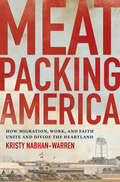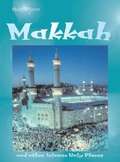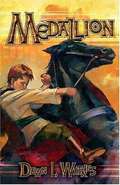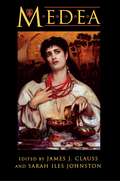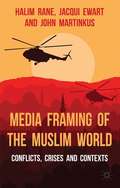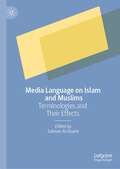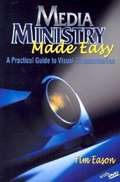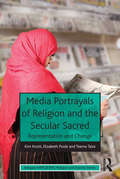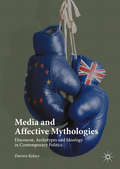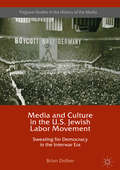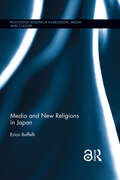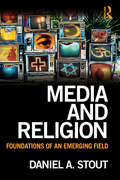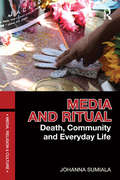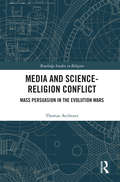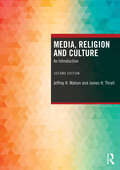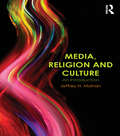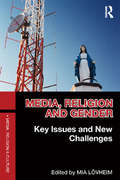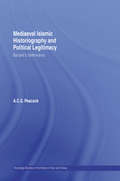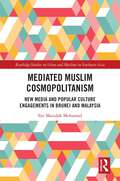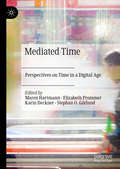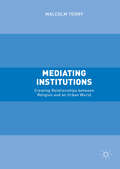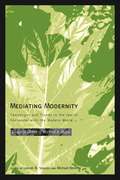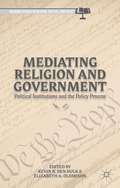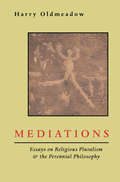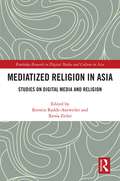- Table View
- List View
Meatpacking America: How Migration, Work, and Faith Unite and Divide the Heartland
by Kristy Nabhan-WarrenWhether valorized as the heartland or derided as flyover country, the Midwest became instantly notorious when COVID-19 infections skyrocketed among workers in meatpacking plants—and Americans feared for their meat supply. But the Midwest is not simply the place where animals are fed corn and then butchered. Native midwesterner Kristy Nabhan-Warren spent years interviewing Iowans who work in the meatpacking industry, both native-born residents and recent migrants from Latin America, Africa, and Asia. In Meatpacking America, she digs deep below the stereotype and reveals the grit and grace of a heartland that is a major global hub of migration and food production—and also, it turns out, of religion. Across the flatlands, Protestants, Catholics, and Muslims share space every day as worshippers, employees, and employers. On the bloody floors of meatpacking plants, in bustling places of worship, and in modest family homes, longtime and newly arrived Iowans spoke to Nabhan-Warren about their passion for religious faith and desire to work hard for their families. Their stories expose how faith-based aspirations for mutual understanding blend uneasily with rampant economic exploitation and racial biases. Still, these new and old midwesterners say that a mutual language of faith and morals brings them together more than any of them would have ever expected.
Mecca and Other Islamic Holy Places (Holy Places)
by Mandy RossAn introduction to Islam which focuses on the holy sites of the religion.
Medallion
by Dawn L. WatkinsBefore taking his place as king of Gadalla, Trave, a young prince, must find a sacred medallion and ward off the forces of the Dark Alliance
Medea: Essays on Medea in Myth, Literature, Philosophy, and Art
by Sarah Iles Johnston James J. ClaussFrom the dawn of European literature, the figure of Medea--best known as the helpmate of Jason and murderer of her own children--has inspired artists in all fields throughout all centuries. Euripides, Seneca, Corneille, Delacroix, Anouilh, Pasolini, Maria Callas, Martha Graham, Samuel Barber, and Diana Rigg are among the many who have given Medea life on stage, film, and canvas, through music and dance, from ancient Greek drama to Broadway. In seeking to understand the powerful hold Medea has had on our imaginations for nearly three millennia, a group of renowned scholars here examines the major representations of Medea in myth, art, and ancient and contemporary literature, as well as the philosophical, psychological, and cultural questions these portrayals raise. The result is a comprehensive and nuanced look at one of the most captivating mythic figures of all time. Unlike most mythic figures, whose attributes remain constant throughout mythology, Medea is continually changing in the wide variety of stories that circulated during antiquity. She appears as enchantress, helper-maiden, infanticide, fratricide, kidnapper, founder of cities, and foreigner. Not only does Medea's checkered career illuminate the opposing concepts of self and other, it also suggests the disturbing possibility of otherness within self. In addition to the editors, the contributors include Fritz Graf, Nita Krevans, Jan Bremmer, Dolores M. O'Higgins, Deborah Boedeker, Carole E. Newlands, John M. Dillon, Martha C. Nussbaum, Christiane Sourvinou-Inwood, and Marianne McDonald.
Media Framing of the Muslim World
by Halim Rane Jacqui Ewart John MartinkusMedia Framing of the Muslim World examines and explains how news about Islam and the Muslim world is produced and consumed, and how it impacts on relations between Islam and the West. The authors cover key issues in this relationship including the reporting on war and conflict, terrorism, asylum seekers and the Arab Spring.
Media Language on Islam and Muslims: Terminologies and Their Effects
by Salman Al-AzamiThis book brings together contributions from ten academics and a commentary from a Muslim community leader on how the British media represent some of the most important terminologies related to Islam and Muslims. It takes a nuanced approach to language within Muslims in the media research by focusing on terminologies. Each contributor in this volume focused on one terminology and its associated words to show how the representation of these terminologies have major implications on the lives of British Muslims. The book also includes some key recommendations on the usage of these terms from the Media Style Guide of the Centre for Media monitoring - a research organisation of the Muslim Council of Britain. This book’s link with the Muslim community can be a step towards new approaches in this field where academics will engage with communities and practitioners to ensure better impact of their academic works. This book will be of interest to students, scholars and practitioners in a range of fields, including Journalism, Media and Communication Studies, English Language and Linguistics, Sociology, Cultural and Religious Studies.
Media Ministry Made Easy: A Practical Guide to Visual Communication
by Tim EasonThis book instructs how to implement an effective media ministry by providing guidance for developing a vision and building a media ministry team, as well as advice about practical matters such as equipment and software needs.
Media Portrayals of Religion and the Secular Sacred: Representation and Change (AHRC/ESRC Religion and Society Series)
by Kim Knott Elizabeth PooleIs it true that Christianity is being marginalised by the secular media, at the expense of Islam? Are the mass media Islamophobic? Is atheism on the rise in media coverage? Media Portrayals of Religion and the Secular Sacred explores such questions and argues that television and newspapers remain key sources of popular information about religion. They are particularly significant at a time when religious participation in Europe is declining yet the public visibility and influence of religions seems to be increasing. Based on analysis of mainstream media, the book is set in the context of wider debates about the sociology of religion and media representation. The authors draw on research conducted in the 1980s and 2008-10 to examine British media coverage and representation of religion and contemporary secular values, and to consider what has changed in the last 25 years. Exploring the portrayal of Christianity and public life, Islam and religious diversity, atheism and secularism, and popular beliefs and practices, several media events are also examined in detail: the Papal visit to the UK in 2010 and the ban of the controversial Dutch MP, Geert Wilders, in 2009. Religion is shown to be deeply embedded in the language and images of the press and television, and present in all types of coverage from news and documentaries to entertainment, sports reporting and advertising. A final chapter engages with global debates about religion and media.
Media and Affective Mythologies
by Darren KelseyThis book provides a timely political insight to show how mythology plays an affective role in our lives. Brexit, bankers, institutional scandals, the far right, and Russell Brand's "revolution" are just some of the issues tackled through this innovative and interdisciplinary discourse analysis. Through multimedia case studies, Kelsey explores the psychological dimensions of archetypes and mythologies and how they function ideologically in contemporary politics. By synergising approaches to critical discourse studies with the work of Carl Jung, Joseph Campbell and other mythologists, Kelsey's psychodiscursive approach explores the depths of the human psyche to analyse the affective qualities of storytelling. Kelsey makes a compelling case for our need to understand more about the power of mythology in modern society. Whilst mythology might be part of who we are, societies are responsible for its ideological substance and implications. Media and Affective Mythologies shows how we can begin to engage with this principle.
Media and Culture in the U.S. Jewish Labor Movement
by Brian DolberThis book explores the Jewish Left's innovative strategies in maintaining newspapers, radio stations, and educational activities during a moment of crisis in global democracy. In the wake of the First World War, as immigrant workers and radical organizations came under attack, leaders within largely Jewish unions and political parties determined to keep their tradition of social unionism alive. By adapting to an emerging media environment dependent on advertising, turn-of-the-century Yiddish socialism morphed into a new political identity compatible with American liberalism and an expanding consumer society. Through this process, the Jewish working class secured a place within the New Deal coalition they helped to produce. Using a wide array of archival sources, Brian Dolber demonstrates the importance of cultural activity in movement politics, and the need for thoughtful debate about how to structure alternative media in moments of political, economic, and technological change.
Media and New Religions in Japan (Routledge Research in Religion, Media and Culture)
by Erica BaffelliThe Open Access version of this book, available at www.taylorfrancis.com/books/9781135117849, has been made available under a Creative Commons Attribution-Non Commercial-No Derivative 4.0 license. Japanese "new religions" (shinshūkyō) have used various media forms for training, communicating with members, presenting their messages, reinforcing or protecting the image of the leader, and, potentially, attracting converts. In this book the complex and dual relationship between media and new religions is investigated by looking at the tensions groups face between the need for visibility and the risks of facing attacks and criticism through media. Indeed media and new technologies have been extensively used by religious groups not only to spread their messages and to try to reach a wider audience, but also to promote themselves as a highly modern and up-to-date form of religion appropriate for a modern technological age. In 1980s and early 1990s some movements, such as Agonshū , Kōfuku no Kagaku, and Aum Shinrikyō came into prominence especially via the use of media (initially publications, but also ritual broadcasts, advertising campaigns, and public media events). This created new modes of ritual engagement and new ways of interactions between leaders and members. The aim of this book is to develop and illustrate particular key issues in the wider new religions and media nexus by using specific movements as examples. In particular, the analysis of the interaction between media and new religions will focus primarily on three case studies predominantly during the first period of development of the groups.
Media and Religion: Foundations of an Emerging Field
by Daniel A. StoutThis text examines the history, theory, cultural context, and professional aspects of media and religion. While religion has been explored more fully in psychology, sociology, anthropology, and the humanities, there is no clear bridge of understanding to the communication discipline. Daniel A. Stout tackles this issue by providing a roadmap for examining this understudied area so that discussions about media and religion can more easily proceed. Offering great breadth, this text covers key concepts and historical highlights; world religions, denominations, and cultural religion; and religion and specific media genres. The text also includes key terms and questions to ponder for every chapter, and concludes with an in-class learning activity that can be used to encourage students to explore the media–religion interface and review the essential ideas presented in the book. Media and Religion is an ideal introduction for undergraduate students in need of a foundation for this emerging field.
Media and Ritual: Death, Community and Everyday Life (Media, Religion and Culture)
by Johanna SumialaThis wide-ranging and accessible book offers a stimulating introduction to the field of media anthropology and the study of religious ritual. Johanna Sumiala explores the interweaving of rituals, communication and community. She uses the tools of anthropological enquiry to examine a variety of media events, including the death of Michael Jackson, a royal wedding and the transgressive actions which took place in Abu Ghraib, and to understand the inner significance of the media coverage of such events. The book deals with theories of ritual, media as ritual including reception, production and representation, and rituals of death in the media. It will be invaluable to students and scholars alike across media, religion and anthropology.
Media and Science-Religion Conflict: Mass Persuasion in the Evolution Wars (Routledge Studies in Religion)
by Thomas AechtnerThis book examines why the religion-science skirmishes known as the Evolution Wars have persisted into the 21st century. It does so by considering the influences of mass media in relation to decision-making research and the Elaboration Likelihood Model, one of the most authoritative persuasion theories. The book’s analysis concentrates on the expression of cues, or cognitive mental shortcuts, in Darwin-sceptic and counter-creationist broadcasts. A multiyear collection of media generated by the most prominent Darwin-sceptic organizations is surveyed, along with rival publications from supporters of evolutionary theory described as the pro-evolutionists. The analysed materials include works produced by Young Earth Creationist and Intelligent Design media makers, New Atheist pacesetters, as well as both agnostic and religious supporters of evolution. These cues are shown to function as subtle but effective means of shaping public opinion, including appeals to expertise, claims that ideas are being censored, and the tactical use of statistics and technical jargon. Contending that persuasive mass media is a decisive component of science-religion controversies, this book will be of keen interest to scholars of Religion, Science and Religion interactions, as well as researchers of Media and Communication Studies more generally.
Media, Religion and Culture: An Introduction
by Jeffrey H. Mahan James H. ThrallReligion has always been shaped by the media of its time. Religious individuals, communities, and institutions use media as tools to communicate, but also as locations where they construct and express identity, practice religion, and build community. This lively book offers a comprehensive introduction to the contemporary field of religion, media, and culture. It explores the religious content of media texts and the reception of those texts by religious consumers who appropriate and reuse them in their own religious work. how new forms of media provide fresh locations for new religious voices and identities to emerge. Thoroughly updated, this second edition of Media, Religion and Culture features case study examples from both established and new religions, and each chapter is followed by insightful Reflections from leading scholars in the field. Illustrated throughout, the book also contains discussion questions and a glossary of key terms.
Media, Religion and Culture: An Introduction
by Jeffrey H. MahanReligion has always been shaped by the media of its time, and today we live in a media culture that informs much of what we think and how we behave. Religious believers, communities and institutions use media as tools to communicate, but also as locations where they construct and express identity, practice religion, and build community. This lively book offers a comprehensive introduction to the contemporary field of religion, media, and culture. It explores: the religious content of media texts and the reception of those texts by religious consumers who appropriate and reuse them in their own religious work; how new forms of media provide fresh locations within which new religious voices emerge, people reimagine the "task" of religion, and develop and perform religious identity. Jeffrey H. Mahan includes case study examples from both established and new religions and each chapter is followed by insightful reflections from leading scholars in the field. Illustrated throughout, the book also contains a glossary of key terms, discussion questions, and suggestions for further reading.
Media, Religion and Gender: Key Issues and New Challenges (Media, Religion and Culture)
by Mia LövheimMedia, Religion and Gender presents a selection of eminent current scholarship that explores the role gender plays when religion, media use and values in contemporary society interact. The book: surveys the development of research on media, religion and culture through the lens of key theoretical and methodological issues and debates within gender studies. includes case studies drawn from a variety of countries and contexts to illustrate the range of issues, theoretical perspectives and empirical material involved in current work outlines new areas and reflects on challenges for the future. Students of media, religion and gender at advanced level will find this a valuable resource, as will scholars and researchers working in this important and growing field.
Mediaeval Islamic Historiography and Political Legitimacy: Bal'ami's Tarikhnamah (Routledge Studies in the History of Iran and Turkey)
by Andrew PeacockThe Tarikhnamah is a history of the world and the oldest surviving work of Persian prose. This book examines it as a political and cultural document and why it became such an influential work in the Islamic world.
Mediated Muslim Cosmopolitanism: New Media and Popular Culture Engagements in Brunei and Malaysia (Routledge Studies on Islam and Muslims in Southeast Asia)
by Siti Mazidah MohamadMohamad examines the day-to-day experience of virtual and non-tangible mobilities of young Bruneian Malay Muslim and Malaysians, as enabled by popular culture and digital media. Cosmopolitanism has garnered interest from sociology, political studies, religious studies, geography, and education scholars. Despite this, there are three gaps in the study of Muslim cosmopolitanism. Firstly, young Muslims' cosmopolitanism in the digital age has not been intensively studied. Secondly, existing research overlooks Southeast Asia, especially Brunei Darussalam. Thirdly, the focus has not sufficiently engaged with popular culture and new media. This book addresses these gaps by exploring the everyday lives of Bruneian Malay Muslim and Malaysian youths, shaped by local, transcultural, and global practices. It expands the Muslim cosmopolitanism concept by examining the daily concerns, challenges, and practices these youths experience, offering new forms of mediated Muslim cosmopolitanism. Grounded in robust empirical data from two extensive research projects (2010-2024), this book employs diverse research approaches (ethnography and phenomenology) and methods (Qualitative Content Analysis and Interviews), ensuring reliable and in-depth findings.Scholars in geography, sociology, religious studies, and youth studies will find this book invaluable for its insights into cosmopolitanism, popular culture, new media, digital youth, and contemporary Southeast Asia.
Mediated Time: Perspectives on Time in a Digital Age
by Maren Hartmann Elizabeth Prommer Karin Deckner Stephan O. GörlandExploring mediated time, this book contemplates how far (and in what ways) media and time are intertwined from a diverse set of theoretical and empirical angles. It builds from theoretical discussions concerning the question of mediation and the normative framing of time (especially acceleration) and works its way through questions of time for/of one’s own, resisting temporalities, polychronicity, in-between-time, simultaneity and other time concepts. It further examines specific time frames, imaginations of a media future and the past, questions of online journalism and multitasking or liveness. Bringing together authors from diverse backgrounds, this collection presents a rich combination of milestone articles, new empirical research, enriching theoretical work and interviews with leading researchers to bridge sociology, media studies, and science and technology studies in one of the first book-length publications on the emerging field of media and time.
Mediating Institutions
by Malcolm TorryThis original book studies a wide variety of mediating institutions, both organizational and non-organizational, in workplaces, residential areas, and in wider society. Focusing upon institutions in the Thames Gateway and with case studies across south-east London, Europe and the USA, Meditating Institutions highlights the importance of understanding, creating and maintaining these organizations that facilitate relationships between religious institutions and others within society. Discussing their structures and activities, the author asserts that good relationships between religious institutions and other groups in our society are essential for a cohesive and peaceful society.
Mediating Modernity: Challenges and Trends in the Jewish Encounter with the Modern World
by Michael Brenner Lauren B. StraussIn Mediating Modernity, contemporary Jewish scholars pay tribute to Michael A. Meyer, scholar of German-Jewish history and the history of Reform Judaism, with a collection of essays that highlight growing diversity within the discipline of Jewish studies. The occasion of Meyer's seventieth birthday has served as motivation for his colleagues Lauren B. Strauss and Michael Brenner to compile this volume, with essays by twenty-four leading academics, representing institutions in five countries. Mediating Modernity is introduced by an overview of modern Jewish historiography, largely drawing on Meyer's work in that field, delineating important connections between the writing of history and the environment in which it is written. Meyer's own areas of specialization are reflected in essays on Moses Mendelssohn, German-Jewish historiography, the religious and social practices of German Jews, Reform Judaism, and various Jewish communities in America. The volume's field of inquiry is broadened by essays that deal with gender issues, literary analysis, and the historical relationship of Israel and the Palestinians. Though other volumes have been compiled to honor Jewish historians, Mediating Modernity is unique in the personal and intellectual relationships shared by its contributors and Michael A. Meyer. Scholars of Jewish studies, German history, and religious history will appreciate this timely volume.
Mediating Religion and Government
by Kevin R. Den Dulk Elizabeth A. OldmixonThe study of religion and politics is a strongly behavioral sub-discipline, and within the American context, scholars place tremendous emphasis on its influence on political attitudes and behaviors, resultuing in a better understanding of religion's ability to shape voting patterns, party affiliation, and views of public policy.
Mediations
by Harry OldmeadowThe unprecedented collision of religions in the contemporary world creates both dangerous antagonism and new possibilities for spiritual growth and renewal. Such possibilities can only be realized through a reaffirmation of the perennial philosophy, which celebrates religious diversity while recognizing that all integral tradition are informed by the same universal principles and values. Mediations examines the ways in which some of the 20th century's most prescient thinkers have responded to the challenges of religious pluralism. It present an overview of the prre-eminint modern perennials--René Guénon, Ananda Coomaraswamy, and Frithjof Schuon--and explores the contribution made to inter-religious understanding by figures as diverse as Carl Jung, Rudolf Otto, Mircea Eliade, Allen Ginsberg, and Swami Abhishiktananda. These provocative essays are addressed of a harmonious world community which cherishes our differences whilst affirming that Wisdom of the Ages which is the patrimony of all humankind. In opening his rare and unique collection of essays, one meets an ancient and eternal world inhabited by the remarkable men who endeavored to come to terms with that world by describing its inscrutable mystery. Focusing on an eclectic representation of writers, from René Guénon and Frithjof Schuon writing on the perennial philosophy to Jung and Eliade who changed the theoretical landscapes of psychology and comparative religion respectively, Harry Oldmeadow has successfully brought together the lives and thoughts of prominent 20th century philosophers and thinkers within a single volume that sheds unexpected light on hidden crystals. --John Herlihy, author of Borderlands of the Spirits, etc. The great confusion of our times sterns from the accelerating centrifugal forces of flight from the Absolute, and from the illusionary influences that seek to reify the Absolute Reality whose principial unity transcends the diversity of its multiple forms. Professor Oldmeadow's essays are an excellent introduction to the great traditionalist metaphysicians of the last century, and to other teachers who, while not strictly within the traditionalist school, have timely lessons to teach us about the basis of a principled pluralism that can light our passage out of the darkening shadows that threaten to engulf us. --Ali Lakhani, editor, Sacred Web Once again Harry Oldmeadow enlightens and delights us with his definitive biographical studies relating to the encounter of East and West.--Wolfgang Smith, author of Cosmos & Transcendence, etc.
Mediatized Religion in Asia: Studies on Digital Media and Religion (Routledge Research in Digital Media and Culture in Asia)
by Kerstin Radde-Antweiler Xenia ZeilerThis edited volume discusses mediatized religion in Asia, examining the intensity and variety of constructions and processes related to digital media and religion in Asia today. Individual chapters present case studies from various regions and religious traditions in Asia, critically discussing the data collected in light of current mediatization theories. By directing the study to the geographical, cultural and religious contexts specific to Asia, it also provides new material for the theoretical discussion of the pros and cons of the concept mediatization, among other things interrogating whether this concept is useful in non-’Western’ contexts."
